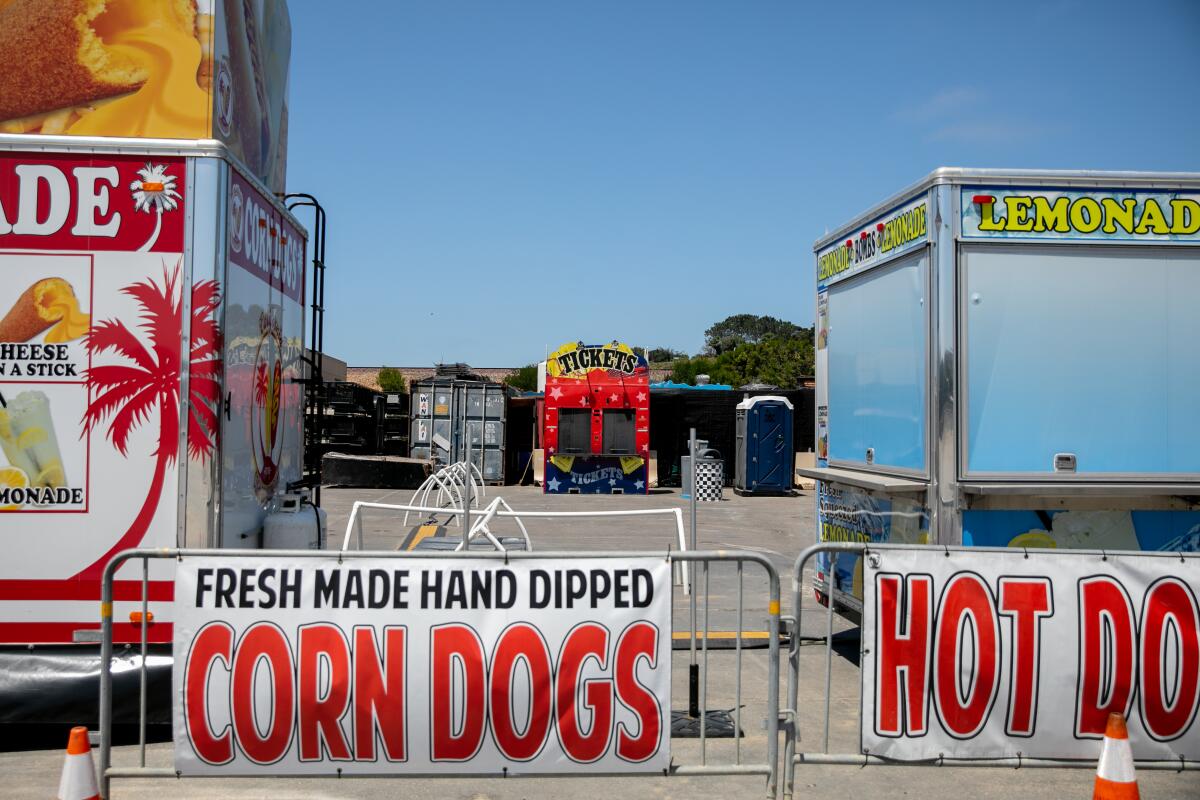Losses continue to mount at Del Mar Fairgrounds, with a grim forecast for 2021

DEL MAR — The fiscal crisis at the Del Mar Fairgrounds continues to deepen.
In the last two weeks, fairgrounds officials canceled all entertainment contracts for 2021, including grandstand and midway shows for the annual San Diego County Fair, and all upcoming equestrian events at the 64-acre Del Mar Horsepark, two miles east of the fairgrounds. People who board their horses there have been told that they will have to find somewhere else to stable their animals after March 31.
The latest developments again call into question the future of the fairgrounds and the long-term viability of horse racing, equestrian events and even the county fair at the state-owned property, which has been operating on a bare-bones budget since the COVID-19 pandemic hit.
Unlike most other government agencies, the 22nd District Agricultural Assn., which runs the fairgrounds, also known as the Del Mar fair board, is funded almost entirely by revenue from the events held there. When the pandemic forced the suspension of all mass gatherings, it also switched off about 90% of the annual revenue for the fairgrounds.
One remaining source of revenue has been the horse park, which rents space to people who board their animals there and for equestrian events such as show jumping. So some people were surprised by Thursday’s announcement that the shows and boarding will be discontinued indefinitely.
“It doesn’t make sense,” said Dale Harvey, a horse show organizer who had more than a dozen events booked at the horse park next year. “It’s one of the parts of the fairgrounds that is profitable and has a steady stream of revenue.”
Fairgrounds officials said they hope to move some of the equestrian events from the horse park to the fairgrounds, but Harvey said that doesn’t seem practical. Most of his events involve hundreds of horses and would conflict with the annual races held by the Del Mar Thoroughbred Club.
It’s more likely he’ll have to go elsewhere, Harvey said, which will be difficult. Most places large enough to hold equestrian events are already booked for 2021.
Horse park activities provide a steady income but are not a big part of fairgrounds revenue, Del Mar officials said.
More significant to the horse park closure is a requirement by the San Diego Regional Water Quality Control Board that the fairgrounds curtail the groundwater pollution that results from boarding, training and showing horses there.
“Continuing with an equestrian presence at the horse park property would require a significant and immediate investment of funds to address water quality requirements, which is simply not possible given the dire effects that the COVID-19 pandemic has had on the fairgrounds’ revenues,” fair board President Richard Valdez wrote in an email.
“We continue to look to the state to assist us with operational support,” Valdez said. “Once we stabilize, our board will continue with our strategic planning process, which will include a comprehensive assessment of all possibilities for our property, including equestrian usages for the horse park property.”
Water quality improvements recently completed in a two-year, $15-million project at the 340-acre fairgrounds include the construction of a treatment plant, a holding pond and wetlands restoration. Fairgrounds officials say that with the economic crisis they face there’s simply no money to make those changes at the horse park.
The future of horse racing at Del Mar has been debated for decades. Animal rights advocates say the sport is cruel and should be stopped, but track enthusiasts contend that thoroughbred horses live to run, that they are well cared for, and that the industry provides many people with much-needed jobs.
Horse racing at the fairgrounds has declined in recent years as wagering has moved online. This year’s races were held with no spectators, which for the first time eliminated the profitable category of food and beverage sales.
Still, Del Mar Thoroughbred Club officials reported in December that wagering was up, more races were run and there were more horses in each race in this year’s five-week meet that ended Nov. 29.
Next November, for the first time since 2017, Del Mar will hold the prestigious Breeders’ Cup. Considered the world championship of horse racing, the Breeders’ Cup extends the season by two days and 14 races, bringing a big boost to overall wagering.
With the advent of COVID-19 vaccines, many people hope that activities at the fairgrounds might return to normal in 2021, which is why the decision to cancel all fairgrounds entertainment contracts for 2021 caught some fair enthusiasts by surprise.
Normally by this time of year, the fairgrounds has signed many of the contracts for entertainment at next summer’s monthlong county fair.
But even with vaccines imminent, the pandemic outlook remains dire. Cases of the virus are still increasing and public health restrictions have been extended, so any mass events at the fairgrounds appear unlikely for at least the first half of 2021.
“There is tremendous uncertainty as to what we will be facing,” fair board Director Fred Schenk said. “We do intend to have ... some kind of fair, but at this point we don’t know what it will look like.”
There are three possible scenarios for the 2021 fair, said Fairgrounds Marketing Director Jennifer Hellman. One would be to schedule only drive-in or drive-through events such as the ones held this year. A second would be limited-access events, the way grocery stores limit the number of patrons. The third option would be normal access as the fair has had in the past.
Without the regular fair, which had 1.5 million visitors in 2019, the fairgrounds remains in fiscal turmoil.
Normally, the fair is the largest single event of the year, generating more than half of the district’s $87 million in revenue from tickets, parking fees, food and beverage sales, and more.
Total revenue from Jan. 1 through Aug. 31 this year was down 88%, according to the most recent data available. The district’s annual budget anticipated more than $74 million in revenue for the eight months, but it received only $8.7 million.
Compounding the financial difficulties is the lack of any significant reserve funds, along with more than $74 million in bond debt for capital projects such as the construction of the racing grandstands finished years ago and the renovation still underway at the off-track betting center into a concert and entertainment venue.
Layoffs announced in June and effective in October left the fairgrounds with just 62 of its 158 full-time employees. No additional layoffs are planned, Hellman said last week.
“Our reduced staff is really making efforts to be creative with our outdoor event space, and we’re still hopeful that the California Department of Food and Agriculture may utilize the significant remaining balance of the $43.3 million in general fund support allocated ... to keep California’s fairgrounds afloat,” Hellman said.
“Meanwhile, we’re continuing to look for income-generating opportunities, keep our expenses down and manage our cash flow while we work on plans and projects for 2021,” she said.
Diehl writes for the San Diego Union-Tribune.
More to Read
Sign up for Essential California
The most important California stories and recommendations in your inbox every morning.
You may occasionally receive promotional content from the Los Angeles Times.











